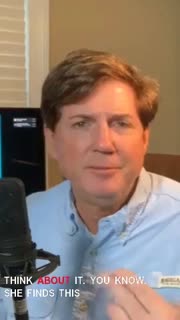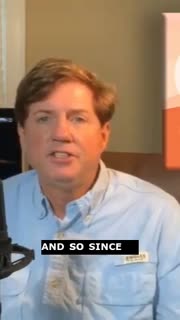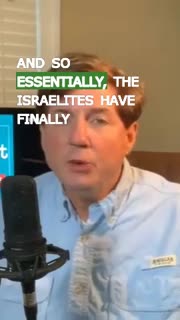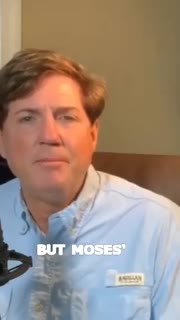Defiance and Deliverance: The Birth of Moses
Summary
### Summary
Today, we embark on a new journey through the book of Exodus, continuing from where Genesis left off. The first five books of the Bible, known as the Torah or Pentateuch, form a continuous narrative, and Exodus picks up the story of the Israelites in Egypt. Initially, the Israelites were welcomed as immigrants under Joseph's protection, but as time passed and a new Pharaoh came to power, their situation drastically changed. This new Pharaoh, who did not remember Joseph's contributions, viewed the growing Israelite population with suspicion and fear, leading to their enslavement and harsh oppression.
The Pharaoh's fear and prejudice culminated in a genocidal decree to kill all newborn Hebrew boys. However, the Hebrew midwives, Shipra and Purah, defied this order, using Pharaoh's own stereotypes against him to save the children. This act of defiance set the stage for the birth of Moses, who was hidden by his mother and later found by Pharaoh's daughter. Despite knowing her father's decree, Pharaoh's daughter chose to protect Moses, demonstrating that God can work through unexpected people to fulfill His plans.
The story of Moses' early life is filled with irony and divine orchestration. Pharaoh saw the Hebrew boys as a threat, but it was the women—Shipra, Purah, Moses' mother, his sister Miriam, and Pharaoh's daughter—who played crucial roles in preserving Moses' life. These women’s courageous actions set in motion the events that would eventually lead to the deliverance of the Israelites from slavery. This narrative reminds us that often, it is the seemingly inconsequential people who make significant impacts by choosing justice and life over oppression and death.
### Key Takeaways
1. The Continuity of God's Plan: The transition from Genesis to Exodus shows the seamless continuation of God's plan for His people. Despite the changing circumstances and the rise of a new Pharaoh, God's purpose for the Israelites remains steadfast. This reminds us that God's plans are not thwarted by human actions or historical changes. [01:09]
2. The Power of Defiance Against Injustice: The Hebrew midwives, Shipra and Purah, exemplify the power of righteous defiance. By refusing to follow Pharaoh's unjust orders, they saved countless lives and set the stage for Moses' survival. Their story encourages us to stand firm against injustice, even when it comes from powerful authorities. [05:32]
3. God's Use of Unexpected People: Pharaoh's daughter, an unlikely ally, played a crucial role in Moses' survival. Her actions demonstrate that God can work through anyone, regardless of their background or beliefs, to accomplish His purposes. This challenges us to see the potential for good in unexpected places and people. [10:32]
4. The Irony of Pharaoh's Fear: Pharaoh feared the Hebrew boys, yet it was the women who orchestrated the events leading to his downfall. This irony highlights the often-overlooked power and influence of those deemed insignificant by society. It serves as a reminder that God often uses the humble and the marginalized to achieve His greatest works. [12:58]
5. Choosing Life Over Death: The actions of Moses' mother, his sister Miriam, and Pharaoh's daughter illustrate the profound impact of choosing life in the face of death. Their courage and ingenuity ensured Moses' survival and ultimately the deliverance of the Israelites. This teaches us the importance of valuing and protecting life, even in dire circumstances. [13:40]
### Youtube Chapters
[0:00] - Welcome
[01:09] - Introduction to Exodus
[02:31] - Israelites in Egypt
[04:19] - Pharaoh's Fear and Oppression
[05:32] - The Defiance of the Midwives
[06:59] - Stereotyping and Dehumanization
[08:13] - Moses' Birth and Hidden Childhood
[09:25] - Pharaoh's Daughter Finds Moses
[10:32] - The Irony of Pharaoh's Decree
[12:15] - Moses' Early Life and God's Plan
[13:40] - The Role of Women in God's Plan
[14:20] - Conclusion and Next Steps
Study Guide
### Bible Study Discussion Guide
#### Bible Reading
1. Exodus 1:7-22 - The Israelites' oppression and the midwives' defiance.
2. Exodus 2:1-10 - The birth of Moses and his rescue by Pharaoh's daughter.
3. Genesis 1:22 - God's command to be fruitful and multiply.
#### Observation Questions
1. What was the initial relationship between the Israelites and the Egyptians when they first arrived in Egypt? ([02:31])
2. How did Pharaoh's perception of the Israelites change over time, and what actions did he take as a result? ([04:19])
3. Who were the key women involved in preserving Moses' life, and what roles did they play? ([12:58])
4. How did the Hebrew midwives, Shipra and Purah, defy Pharaoh's orders, and what was their reasoning? ([05:32])
#### Interpretation Questions
1. What does the transition from Genesis to Exodus reveal about the continuity of God's plan for His people? ([01:09])
2. How does the story of the Hebrew midwives illustrate the power of defiance against injustice? ([05:32])
3. In what ways does Pharaoh's daughter's actions challenge our understanding of who God can use to fulfill His purposes? ([10:32])
4. What is the significance of the irony that Pharaoh feared the Hebrew boys, yet it was the women who orchestrated the events leading to his downfall? ([12:58])
#### Application Questions
1. Reflect on a time when you felt God's plan for your life was disrupted by external circumstances. How did you see His purpose continue despite those changes? ([01:09])
2. Have you ever had to stand up against an unjust authority or situation? What gave you the courage to do so, and what was the outcome? ([05:32])
3. Think of someone unexpected in your life who has been a source of support or guidance. How can you show appreciation for their impact on your journey? ([10:32])
4. How can you recognize and support the often-overlooked contributions of those deemed insignificant by society in your community or church? ([12:58])
5. In what ways can you choose life and justice in your daily decisions, especially when faced with difficult or oppressive circumstances? ([13:40])
6. Identify a situation where you can act courageously to protect or value life, even if it seems risky or challenging. What steps will you take to make a difference? ([13:40])
7. How can you encourage others to see the potential for good in unexpected places and people, just as Pharaoh's daughter did with Moses? ([10:32])
Devotional
Day 1: The Continuity of God's Plan
God's plan for His people is unwavering and continuous, as seen in the seamless transition from Genesis to Exodus. Despite the changing circumstances and the rise of a new Pharaoh who did not remember Joseph, God's purpose for the Israelites remained steadfast. This continuity reminds us that God's plans are not thwarted by human actions or historical changes. The Israelites' journey from being welcomed immigrants to oppressed slaves under a new ruler highlights the resilience of God's overarching plan. Even in the face of adversity, God's purpose for His people remains unshaken, demonstrating His sovereignty and faithfulness. [01:09]
Exodus 1:8-10 (ESV): "Now there arose a new king over Egypt, who did not know Joseph. And he said to his people, 'Behold, the people of Israel are too many and too mighty for us. Come, let us deal shrewdly with them, lest they multiply, and, if war breaks out, they join our enemies and fight against us and escape from the land.'"
Reflection: Think about a time when you felt uncertain about the future. How can you trust in God's continuous plan for your life, even when circumstances change?
Day 2: The Power of Defiance Against Injustice
The Hebrew midwives, Shipra and Purah, exemplify the power of righteous defiance. By refusing to follow Pharaoh's unjust orders to kill all newborn Hebrew boys, they saved countless lives and set the stage for Moses' survival. Their courageous actions demonstrate that standing firm against injustice, even when it comes from powerful authorities, can lead to significant change. This story encourages us to act with integrity and courage in the face of oppression, knowing that our actions can have a profound impact on the lives of others. [05:32]
Exodus 1:17 (ESV): "But the midwives feared God and did not do as the king of Egypt commanded them, but let the male children live."
Reflection: Consider a situation where you are faced with an unjust or unethical demand. How can you stand firm in your faith and act with integrity, even if it means defying powerful authorities?
Day 3: God's Use of Unexpected People
Pharaoh's daughter, an unlikely ally, played a crucial role in Moses' survival. Despite knowing her father's decree, she chose to protect Moses, demonstrating that God can work through anyone, regardless of their background or beliefs, to accomplish His purposes. This challenges us to see the potential for good in unexpected places and people. It reminds us that God often uses those we least expect to fulfill His plans, encouraging us to remain open to the ways God might work through us and others. [10:32]
Exodus 2:5-6 (ESV): "Now the daughter of Pharaoh came down to bathe at the river, while her young women walked beside the river. She saw the basket among the reeds and sent her servant woman, and she took it. When she opened it, she saw the child, and behold, the baby was crying. She took pity on him and said, 'This is one of the Hebrews' children.'"
Reflection: Reflect on someone in your life who has surprised you with their kindness or support. How can you be more open to seeing God's work through unexpected people?
Day 4: The Irony of Pharaoh's Fear
Pharaoh feared the Hebrew boys, yet it was the women—Shipra, Purah, Moses' mother, his sister Miriam, and Pharaoh's daughter—who orchestrated the events leading to his downfall. This irony highlights the often-overlooked power and influence of those deemed insignificant by society. It serves as a reminder that God often uses the humble and the marginalized to achieve His greatest works. This narrative encourages us to recognize and value the contributions of those who may be overlooked or underestimated. [12:58]
1 Corinthians 1:27-28 (ESV): "But God chose what is foolish in the world to shame the wise; God chose what is weak in the world to shame the strong; God chose what is low and despised in the world, even things that are not, to bring to nothing things that are."
Reflection: Think about someone in your community who is often overlooked or underestimated. How can you support and uplift them, recognizing their potential to make a significant impact?
Day 5: Choosing Life Over Death
The actions of Moses' mother, his sister Miriam, and Pharaoh's daughter illustrate the profound impact of choosing life in the face of death. Their courage and ingenuity ensured Moses' survival and ultimately the deliverance of the Israelites. This teaches us the importance of valuing and protecting life, even in dire circumstances. It challenges us to make choices that promote life and justice, trusting that God can use our actions to bring about His purposes. [13:40]
Deuteronomy 30:19-20 (ESV): "I call heaven and earth to witness against you today, that I have set before you life and death, blessing and curse. Therefore choose life, that you and your offspring may live, loving the Lord your God, obeying his voice and holding fast to him, for he is your life and length of days, that you may dwell in the land that the Lord swore to your fathers, to Abraham, to Isaac, and to Jacob, to give them."
Reflection: Reflect on a recent decision you made. Did it promote life and justice? How can you make choices today that align with God's call to choose life?
Quotes
### Quotes for outreach
1. "It's the stereotyping that dehumanizes us. It's the other that makes people seem less than human, kind of like animals or something. And so Shipra and Purah, they're very shrewd. They play right into those prejudices, you know. And so, you know, this was their subversive way to save those babies' lives." [06:59] (22 seconds)
2. "Think about it. You know, she finds this baby floating in a basket. And suddenly, Who? This young girl just happens to step out from the bushes and say, Oh wow! I see you got a baby there. Would you like me to go find someone to nurse that baby for you? What's really going on here? Can you almost imagine that their eyes sort of locked? Just kind of nodding and saying, Yes." [11:22] (27 seconds)
3. "It shows that, that so many times it is the people that we might not think about, it's consequential people sometimes doing the right thing that makes all the difference. And what you and I do with that, I guess is, is up to us, right? We choose to do what's just what is right when we choose life over death. It makes a difference. Never forget that." [13:40] (26 seconds)
### Quotes for members
1. "And so since Joseph was second in command in Egypt, it was a very amicable relationship. And so then we get on to the end of chapter 50, and that's where we read that Joseph dies. And then we turn the page, and we have the book." [02:31] (16 seconds)
2. "And so essentially, the Israelites have finally done what God wanted them to do. But unfortunately, they have done it at a very bad time. Because when we move on to the very next verse, it tells us that a new king, to whom Joseph, Joseph meant nothing, came to power in Egypt." [03:19] (20 seconds)
3. "And so one of the lessons that I wanted to point out from today is the irony that Pharaoh had seen only the boys as a threat. But don't you see, it's really the girls, it's these women, Shipra and Purah, Moses' mom and sister Miriam, and even the daughter of Pharaoh, who set in motion what's going to be the downfall of Pharaoh." [12:15] (25 seconds)
4. "But Moses' story simply wouldn't have happened if not for these women, who refused to abide to the Pharaoh's law, because that law, you know, was at its heart unjust. I really love these stories. I just think they're in and of themselves just amazing." [13:40] (23 seconds)







